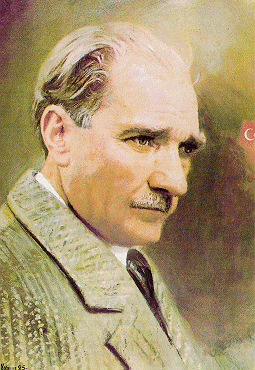 With
the signing of the Lausanne Peace Treaty, the need arose for a name to give to
the new state. Throughout the war, nothing had been done to the sultan, who
had viewed very coldly the struggle for independence. After the war the
sultanate had been abolished, and on October 29, 1923, the name of the new
state was officially declared by the National Assembly to be the Republic of
Turkey. Thus was born the first republic on the continent of Asia or of
Africa.
With
the signing of the Lausanne Peace Treaty, the need arose for a name to give to
the new state. Throughout the war, nothing had been done to the sultan, who
had viewed very coldly the struggle for independence. After the war the
sultanate had been abolished, and on October 29, 1923, the name of the new
state was officially declared by the National Assembly to be the Republic of
Turkey. Thus was born the first republic on the continent of Asia or of
Africa.
Although Gazi Mustafa Kemal Pasha was elected
president, power was in the hands of the National Assembly. Nevertheless, Atatürk's
influence on the state and the party was always strongly felt.
When the republic was declared, the state of the
nation was at a very low ebb, exhausted from both the economic and social
points of view. The population was barely thirteen million, and only ten
percent of the people could read and write. Only 23 lycees and one university
existed in the whole land, and there were almost no schools where one could
learn a trade. There was no industry: What workshops and manufacturing did
exist amounted to little more than handicrafts. Only 80 thousand workers lived
in the entire country. Machinery and equipment, and all products of industry
were imported, and agriculture was in total collapse. The productive populace
had been decimated by years of war. Supposedly an agricultural nation, Turkey
was on occasion forced to import grain. Certain crops which in our time are
considered everyday (citrus fruit, tea, bananas) were at that time unknown to
the populace.
Fiscal affairs were in a pitiful state. The Ottoman
budget had shown a steady deficit, and 30% always had to be allocated for
repayment of debts. The war had eaten up whatever fiscal resources were
available. The government of the new republic assigned the greatest importance
to these matters, and managed to maintain the value of the Turkish Lira right
up to World War II, but nevertheless there was little in the way of funds.
Angered that the capitulations had been ended, the wealthy nations refused to
offer credit. The western regions of the country were savagely battle-scarred,
and there was no infrastructure, and revenues from taxation were extremely
meager.